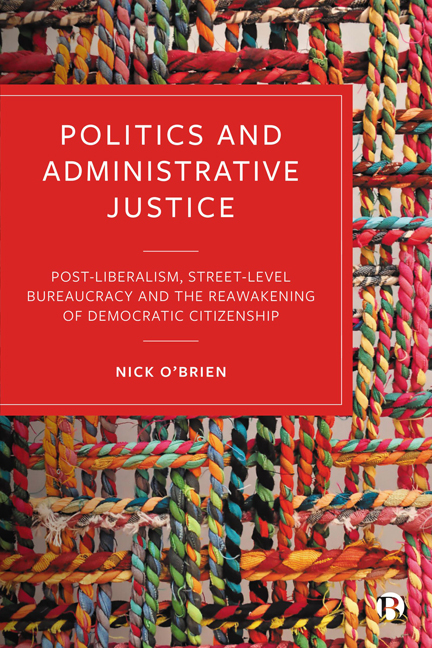 Politics and Administrative Justice
Politics and Administrative Justice Book contents
- Frontmatter
- Dedication
- Contents
- About the Author
- Acknowledgements
- 1 Introduction
- 2 Street-Level Bureaucracy and the Response to Citizen Grievance
- 3 The ‘Social Imaginary’ of Liberal Legalism
- 4 The Promise of Postliberalism
- 5 Citizen Grievance and the Spectre of Legalism
- 6 Postliberal Accountability: The Challenge of Disability Human Rights
- 7 Responding to Grievance: Mental Health and Special Educational Needs and Disability
- 8 Postliberal Administrative Justice
- 9 Conclusion
- References
- Index
6 - Postliberal Accountability: The Challenge of Disability Human Rights
Published online by Cambridge University Press: 27 March 2024
- Frontmatter
- Dedication
- Contents
- About the Author
- Acknowledgements
- 1 Introduction
- 2 Street-Level Bureaucracy and the Response to Citizen Grievance
- 3 The ‘Social Imaginary’ of Liberal Legalism
- 4 The Promise of Postliberalism
- 5 Citizen Grievance and the Spectre of Legalism
- 6 Postliberal Accountability: The Challenge of Disability Human Rights
- 7 Responding to Grievance: Mental Health and Special Educational Needs and Disability
- 8 Postliberal Administrative Justice
- 9 Conclusion
- References
- Index
Summary
Responsive legality, formally articulated in the US in the 1960s, largely failed to take root in the UK, despite the seeds of such an approach contained in the aspirations for tribunals between the World Wars, and for the ombud after the Second World War. More recently, administrative justice in England specifically, by contrast with the devolved administrations in Scotland, Wales and Northern Ireland, has at times been out of step with developments in other areas of substantive law which have implications for it and for the relationship between citizen and state. One significant area of innovation has been that of disability human rights, as part of a broader awakening of interest in the significance of disability as a social construct and as a litmus test more generally for inclusive citizenship. The advent of disability human rights as a ‘new paradigm’ in a legal context has been matched therefore by its reception as an aspect of human experience that must be reckoned with in any public philosophy that seeks to respond purposefully to contemporary society. The implications of disability human rights for the task of responding to citizen grievance in a postliberal context assume powerful illustrative force.
Disability human rights and social movement politics
‘Teamwork at the heart of everything’
Bert (later Sir Bert) Massie was born into a large working-class family in Liverpool shortly after the Second World War. When he was three months old, doctors told his mother he had polio. At that moment, his personal life became inescapably entangled with the development of disability rights. Yet the language of disability rights was for much of Massie’s life unavailable as an interpretative framework: as a child, he had no inkling that he was ‘disabled’ until somebody told him. Yet human diversity on the street where he grew up was inescapable: epilepsy, deafness, immobility, facial disfigurement and myriad other hidden impairments (Massie, 2019: 48–9).
The significance of social class and social disadvantage was not lost on him, nor the importance, and at times the ambiguous quality, of the emergent welfare state as a means of lifting people out of poverty: too often ‘things done to you, not with you’, and early social segregation at the Children’s Rest School of Recovery in Liverpool.
- Type
- Chapter
- Information
- Politics and Administrative JusticePostliberalism, Street-Level Bureaucracy and the Reawakening of Democratic Citizenship, pp. 70 - 87Publisher: Bristol University PressPrint publication year: 2023


